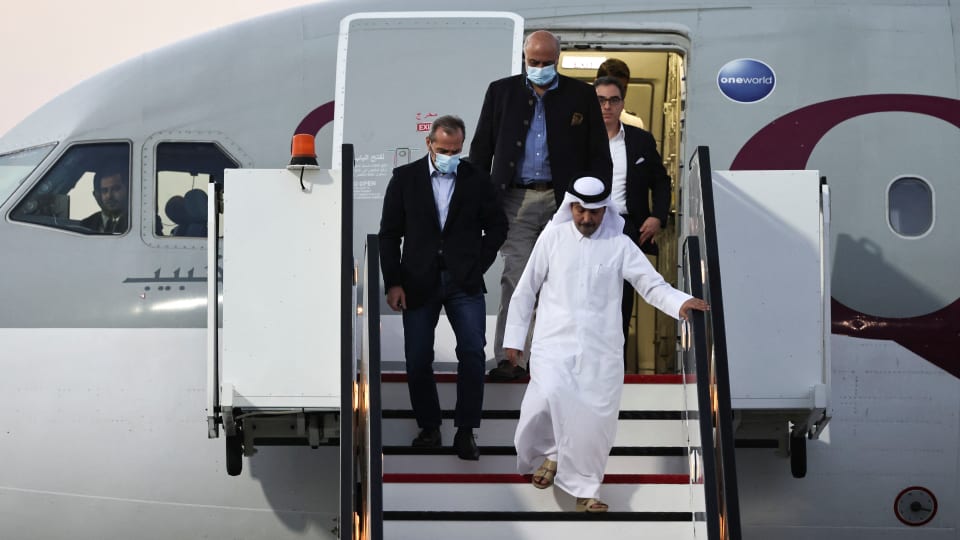- A prisoner exchange between the USA and Iran has been planned for months.
- Five US prisoners have now been released. In return, five Iranians from US custody can return to their homeland.
- Switzerland was involved in the prisoner exchange with its good offices.
Iran has released several US citizens as part of a prisoner swap. They were flown aboard a plane from Tehran to Qatar.
Legend:
Siamak Namasi, Morad Tahbas and Emad Shargi (men in black suits from right to left) arrive at Doha International Airport in Qatar.
REUTERS/Mohammed Dabbous
The prisoner swap had been prepared for months. The Gulf states of Oman and Qatar played a particularly important role in the negotiations. At the beginning of August, Iran placed the released Americans under house arrest in a hotel in the capital Tehran. Now they can leave the country.
According to Tehran and Washington, the money to which Iran is supposed to have access was exchanged by South Korea in several tranches for euros and transferred to Qatar. The Islamic Republic should be able to use the assets to purchase goods under supervision that are not affected by international sanctions. Due to the punitive measures, Iran is cut off from global payment transactions.
EDA involved in the exchange
The Federal Department of Foreign Affairs (FDFA) has welcomed the prisoner exchange between the USA and Iran. The FDFA would like to thank all countries involved for the trust they have placed in it, it said in a statement. Foreign Minister Ignazio Cassis also thanked Iran and the USA on X, formerly Twitter.
Thanks to its many years of experience, Switzerland contributed significantly to the success of this humanitarian gesture and facilitated the associated transfer of blocked funds from South Korea to Iran. Switzerland took on this key role as part of its good offices and at the request of all parties involved.
US President Joe Biden thanked Switzerland and the governments of other countries involved in the prisoner exchange with Iran. Switzerland, Qatar, Oman and South Korea had worked “tirelessly” towards the agreement alongside the Americans, he said.
Mike Pence: “Largest ransom payment in US history”
There had previously been a lot of criticism of the agreement with Tehran. Former US Vice President Mike Pence, for example, described the deal as “the largest ransom payment in American history.” Critics warned that Tehran could possibly use the billions for military purposes.
The US government has tried to allay such concerns in recent weeks. She emphasized several times that the billions could only be used for humanitarian purposes – for example for medicine or food.
Foreigners held hostage in Iran
It is not a ransom and not money from US taxpayers, but rather Iranian money that should only benefit the Iranian people and not Iran’s leadership. The US side also previously rejected statements by Iranian President Ebrahim Raisi that the money should flow into other areas, such as domestic production.
Iran repeatedly imprisons foreigners on charges of espionage or other violations of national security. Human rights activists criticize the proceedings, which are often held behind closed doors, as unfair. The Islamic Republic is also accused of holding foreigners hostage.
